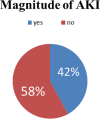Burden and risk profile of acute kidney injury in severe COVID-19 pneumonia admissions: a Finding from Jimma University medical center, Ethiopia
- PMID: 38504176
- PMCID: PMC10953204
- DOI: 10.1186/s12882-024-03522-0
Burden and risk profile of acute kidney injury in severe COVID-19 pneumonia admissions: a Finding from Jimma University medical center, Ethiopia
Abstract
Background: Acute kidney injury (AKI) is a serious complication of the Corona Virus Disease of 2019 (COVID-19). However, data on its magnitude and risk factors among hospitalized patients in Ethiopia is limited. This study aimed to determine the magnitude of AKI and associated factors among patients admitted for severe COVID-19 pneumonia.
Methods: An institution-based retrospective cross-sectional study was conducted among 224 patients admitted to Jimma University Medical Center in Ethiopia for severe COVID-19 pneumonia from May 2020 to December 2021. Systematic random sampling was used to select study participants. Medical records were reviewed to extract sociodemographic, clinical, laboratory, therapeutic, and comorbidity data. Bivariable and multivariable logistic regressions were performed to examine factors associated with AKI. The magnitude of the association between the explanatory variables and AKI was estimated using an adjusted odds ratio (AOR) with a 95% confidence interval (CI), and significance was declared at a p-value of 0.05.
Results: The magnitude of AKI was 42% (95% CI: 35.3-48.2%) in the study area. Mechanical ventilation, vasopressors, and antibiotics were required in 32.6, 3.7, and 97.7% of the patients, respectively. After adjusting for possible confounders, male sex (AOR 2.79, 95% CI: 1.3-6.5), fever (AOR 6.5, 95% CI: 2.7-15.6), hypoxemia (AOR 5.1, 95% CI: 1.4-18.9), comorbidities (AOR 2.8, 95% CI: 1.1-7.0), and severe anemia (AOR 10, 95% CI: 1.7-65.7) remained significantly associated with higher odds of AKI.
Conclusion: The burden of AKI among patients with severe COVID-19 pneumonia is high in our setting. Male sex, abnormal vital signs, chronic conditions, and anemia can identify individuals at increased risk and require close monitoring and prevention efforts.
Keywords: Acute kidney injury; COVID-19; Ethiopia.
© 2024. The Author(s).
Conflict of interest statement
The authors declare no competing interests.
Figures
Similar articles
-
Acute kidney injury in patients with COVID-19: a retrospective cohort study from Switzerland.Swiss Med Wkly. 2021 Mar 1;151:w20482. doi: 10.4414/smw.2021.20482. eCollection 2021 Mar 1. Swiss Med Wkly. 2021. PMID: 33706383
-
Risk factors associated with acute kidney injury in a pediatric intensive care unit in Addis Ababa Ethiopia: case-control study.BMC Nephrol. 2023 Sep 21;24(1):279. doi: 10.1186/s12882-023-03322-y. BMC Nephrol. 2023. PMID: 37735373 Free PMC article.
-
Psychological impact of COVID-19 outbreak among Jimma University Medical Centere visitors in Southwestern Ethiopia: a cross-sectional study.BMJ Open. 2021 Jan 6;11(1):e043185. doi: 10.1136/bmjopen-2020-043185. BMJ Open. 2021. PMID: 33408210 Free PMC article.
-
COVID-19 disease severity and associated factors among Ethiopian patients: A study of the millennium COVID-19 care center.PLoS One. 2022 Jan 27;17(1):e0262896. doi: 10.1371/journal.pone.0262896. eCollection 2022. PLoS One. 2022. PMID: 35085338 Free PMC article.
-
Risk factors for mortality among hospitalized COVID-19 patients in Northern Ethiopia: A retrospective analysis.PLoS One. 2022 Aug 11;17(8):e0271124. doi: 10.1371/journal.pone.0271124. eCollection 2022. PLoS One. 2022. PMID: 35951497 Free PMC article. Review.
References
MeSH terms
LinkOut - more resources
Full Text Sources
Medical



